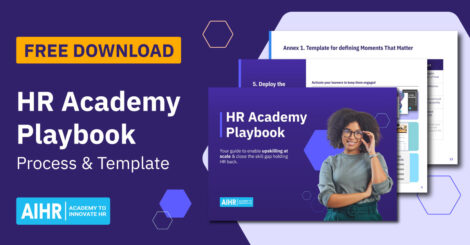3 HR Roles of the Future

We talk a lot about how technology is changing the world of work. And indeed, the combination of automation and the arrival of new technologies will lead to the extinction of certain jobs, but more importantly, it will also create new jobs and push a lot of us to upskill in order to get ready for the future.
We also talk a lot about the role of HR in this digital transformation; how can HR help organizations and their employees to become future proof? What we don’t talk about, or at least not as often, is what HR will look like a couple of years from now. What are the HR roles of the future?
According to a KPMG report, 3 in 5 HR leaders believe that the HR function may become irrelevant if it doesn’t modernize its approach. What’s more, only 37% of HR leaders are very confident in HR’s ability to transform the workforce and itself.
This highlights the importance of HR professionals future-proofing their skills. If they want to stay relevant, their skills need to be relevant too.
In this article, we’ll take a quick look at four HR competencies that we believe will be key to HR success. We’ll also take a shot at describing three roles that will be crucial for HR in the near future.
HR Competencies for 2025
At AIHR, we have defined four HR core competencies that HR professionals need to perform well in their role in the (near) future. We have based this on existing as well as our own research.
These competencies are:
- Data driven, also known as evidence-based, is the ability to read, apply, create, and communicate data into valuable information to influence decision-making processes.
- Business acumen, also known as business savvy or business sense, is the ability to translate the organization’s purpose, mission, goals, and business context into strategy, positioning HR policies and activities to best serve the organization’s interests.
- Digital integration is the ability to leverage technology to increase efficiency and to drive HR and business value.
- People’s advocate is the ability to build a strong internal culture, communicate skillfully, get the best out of people, and act as a trusted employee champion.
These core competencies are complemented by role-specific functional competencies, for example, compensation & benefits, people analytics, or learning & development.

HR Roles of the Future
As we now have an idea about the skills HR professionals will need to succeed in the future, we can start to think about what the various HR roles of the future could look like.
While there will still be a need for an all-around, generalist type of HR professional, they will need to be equipped with a new range of skills.
At the same time – driven by current developments on a technological and global workforce level – there will be a need for HR specialists who are, next to having the core skills, experts in their specific area of HR.
A couple of HR roles of the future we could imagine seeing (a lot) more of:
The Digital Evangelist
The current explosion of HR technology is far from over. On the contrary, there is hardly any HR function left that doesn’t have an impressive range of software and tools designed to automate and digitize its processes. In recruitment tech alone, there are about a dozen new solutions a week coming onto the market.
Needless to say, it’s impossible for everyone in HR to keep up with the latest tech on top of all their other activities. Especially since the number of HR tech solutions is likely to further increase over the next years.
As such, we can imagine organizations having their very own Digital HR Evangelist. A few characteristics of this person:
- someone who is passionate about all things HR tech
- equipped with the necessary skills to grasp the essence of new solutions and their potential benefits for the organization
- digitally and tech savvy
- always willing to try new technology and not afraid to question existing solutions
- able to get all stakeholders on board when it comes to the implementation and use of a new solution; the Evangelist part of the job.
The Chess Master
The time when your average workforce mainly consisted of full-time employees is long gone. Today’s employees are a mix of freelancers, part-timers, full-times, contractors, and everything in between.
While this new composition certainly has its advantages – think flexibility, expertise and different perspectives on the business – it also has its challenges.
One of them being succession planning.
Because how do you plan ahead when you don’t know what your needs will be or how much of your workforce will consist of full-timers and contingent workers?
If succession planning was a challenge before, when HR still more or less had a certain visibility on who was going to leave and when, it has become a completely different ball game now.
Think for example of the challenges that come with the rapidly aging workforce or the increasing automation that will cause shifts in both work and workforce.
And let’s not forget about recruitment, because when we talk about workforce planning recruitment is an inevitable part of the equation.
When we think about HR roles of the future, someone who is an expert in strategic workforce planning, or, as we like to call it, a true Chess Master, is indispensable.
A few characteristics of this person:
- someone with a knack for solving complicated puzzles (problem-solving)
- who is well-organized
- with a natural tendency to think outside the box and look at problems from various angles
- digitally and tech savvy
- able to quickly adapt to changing circumstances
The People Data Wizard
It’s impossible to think of technology without data. The vast majority of HR tech solutions is driven by data and has an analytics function. This is one side of the data spectrum.
People analytics is the other. Thanks to the increase of cloud-based HR systems, more and more organizations now store their people data. In order to leverage this data though, they need someone who knows how to work with it.
This means – among other things – a data scientist who knows what data can be used (scientifically validated), where it should be stored (centrally), and, of course, how to get valuable and actionable insights from it that have a positive impact on the business.
But this role entails a lot more.
Digital HR enables us to think smarter about what data will lead to better performance. Based on this information we can build our systems and start doing our people analytics.
The People Data Wizard, therefore, is more of a people data and systems wizard. The below image illustrates this well.
Image source – PA: FOW conference
And let’s not forget about the fact that a People Data Wizard needs to be able to translate this ‘foreign data language’ into normal people English if they want the rest of the organization to understand them.
When it comes to the characteristics of this person we imagine:
- someone who is very rigorous
- who loves numbers
- with a strong analytical mind
- able to tell a compelling story
- digitally and tech savvy
The importance of collaboration
While the HR roles of the future will be (much more) specialized, it would be wrong to think of them as separate entities. In order for each function to really work, our ‘special HR units’ need to collaborate closely.
Because, for instance, when the Chess Master starts planning workforce and recruitment needs, they will undoubtedly need relevant people data and supporting technology solutions to create a solid strategy.
This means they will need to consult with both the People Data Wizard and the Digital Evangelist.
The same thing goes for any other kind of HR issue that needs to be dealt with, whether it’s a topic related to performance management, learning & development, or onboarding; in order to come up with a good strategy and execution, all special HR units will have to work together.
On a final note
In a time where automation and new technologies are rapidly changing the world of work, HR will play a big role in helping organizations and their people become future-proof.
But HR itself will look pretty different in the not too distant future too.
HR professionals will need to equip themselves with a new range of skills including people analytics, digital HR, strategic workforce planning, design thinking, and stakeholder management.
While there will still be a need for an all-around, generalist type of HR professional, there will also be a need for HR specialists with deep expertise in their areas.
The three roles we mentioned in this article are an example of HR roles of the future we could imagine seeing (a lot) more of. There are without a doubt more of them that we’ve missed. Feel free to add your vision on future HR roles below and we’ll happily include them in a later version!
If you want to future-proof your HR skill set and develop new HR competencies, check out our All You Can Learn Certification Program!
Weekly update
Stay up-to-date with the latest news, trends, and resources in HR
Learn more
Featured content from AIHR Academy
Related articles
Are you ready for the future of HR?
Learn modern and relevant HR skills, online













